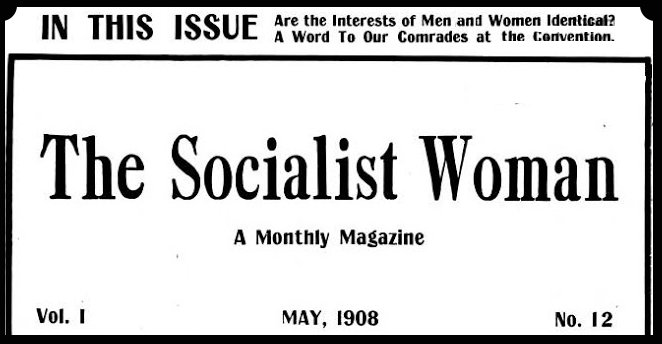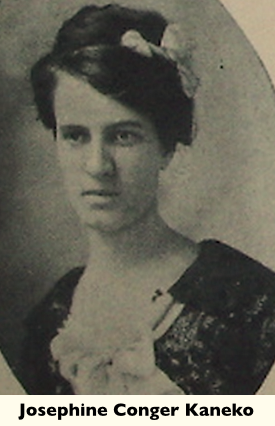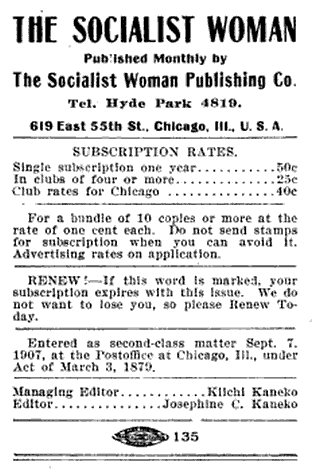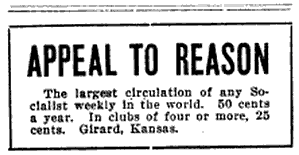Women are tired of being “included,”
tired of being taken for granted.
They demand definite recognition,
even as men have it.
-Josephine Conger Kaneko
Hellraisers Journal, Monday May 11, 1908
Chicago, Illinois – National Convention of Socialist Party of America
From the Appeal to Reason of May 9, 1908:
The Convention
—–
The greatest political convention ever held in the interest of the working class in the United States will begin its deliberations on May 10th in the city of Chicago. This convention will represent every state and territory in the union and it will be the only political convention which will adopt a platform and name national candidates wholly in the name, and for the benefit of the working class.
Compared to the conventions of capitalist parties this will be a unique gathering. It will consist of both men and woman and its deliberations will be marked by the one unvarying purpose to faithfully express in political terms the economic interests of the working class….
The Appeal sends greetings to the delegates assembled at Chicago. It has full faith in their ability to clearly see the important duties which lie before them, and in their fidelity to discharge those duties with equal credit to themselves and the party.
———-
[Photograph added.]
From The Socialist Woman of May 1908:
ARE THE INTERESTS OF MEN AND WOMEN IDENTICAL?
A Suggestion to the National Convention
—–Josephine C. Kaneko.
It is an oft repeated phrase among Socialist agitators that the interests of men and women of the working class are identical, and therefore there should be no methods of education and appeal instituted for one sex alone; but that all efforts of this kind should be directed from one point, whether it be newspaper, pamphlet, street corner or platform, to all persons regardless of sex, creed or color.
And on this theory our educational work has proceeded, in this country at least, for the past quarter of a century. That is, we think we have proceeded on this theory. But it does not take very careful thought on the matter to discover that we have not acted in accordance with our theory at all, but have worked always as a matter of expediency along the line of least resistance with the male portion of humanity. It has never been very likely that we could reach the workingman in his wife’s kitchen or nursery, or her little parlor, and as it has seemed more expedient to work with him than with her, we have followed him to his lair—to the street corner, to the trade union hall, to the saloon. We have opened our locals in localities where he could be most easily reached, and have accommodated the environment to his tastes and needs. The little room at the rear of the saloon has not been so comfortable as his wife’s parlor or sitting room, and sometimes no larger. but he has felt more at ease in it when congregating with other men, so the locals have in some instances been established in the rear rooms of saloons, and frequently in other dreary, comfortless halls which are always obnoxious to women.
We have said, half-heartedly, that women could come to our locals in these dreary places. But they haven’t cared to come to any great extent, any more than the men would have cared to meet in the women’s parlors. It has been plainly a discrimination in favor of one sex above another. But it has always seemed a matter of expediency.
As we have chosen our meeting places in the favor of men, we have also directed our speeches and our published matter to mankind. His wrongs and his needs have filled our mouths and our newspaper columns with the exceptional moment when we have given publicity to the oppression and needs of women. This, too, has seemed a matter of expediency; we have always had male audiences and male readers, and naturally have made our principal appeal to them.
But all this belonged to the cruder days of our movement. To a time when we were willing to trim a little in the matter of principle in order to get a foothold, to force an opening wedge. This latter task has been accomplished. Our national vote in 1904 was 403,000. This is something more than an entering wedge. It is a fair foundation upon which to build for the future.
It is time now, that we cease our appeal to men alone, and give some attention to womankind. It is not enough to say that “the interests of the workingman and woman are identical, therefore what we say to the workingman includes the woman also.” It does not include her, so far as she is concerned, unless her part in the struggle for existence is pointed out. Unless her influence on racial and social development is clearly explained; unless we say at least one time in ten or twenty, that industry, which is the foundation of all modern progress, began with woman.
Women are tired of being “included,” tired of being taken for granted. They demand definite recognition, even as men have it. They know that their interests and men’s interests have not been identical since the dawn of human history, and it will take some thing more than a mere statement of the fact to make them believe that they can be identical under Socialism. They have got to be told, just as the workingman is told, with infinite patience and pains, that his interests and those of his employer are NOT identical under capitalism. She who was the first slave, the beast of burden, the bought and sold property of another, the forced mate of an unloved and unlovable companion, the enforced mother, the social underling, the non citizen—she who has been exploited from the time that man first began to record his doings will not quickly believe us when we say, without further explanation, that her interests and those of her self-constituted superior are identical.
Fortunately for our propaganda and educational work among women we have illustrious teachers whose guidance we may safely follow. Engles knew that in his “Origin of the Family” lay the very foundation stones of the Socialist philosophy. Bebel was not afraid of drawing sex lines when he wrote his “Woman.” Marx and all the others built upon Morgan’s “Ancient Society” which is nothing, if not a history of woman in society. No Socialist dares call himself scientific unless he has studied well into the woman question. He has found deep veins of it in his sociological research. He has found that he cannot know history without learning something about woman, so fundamental is her relation to society.
If it is still expedient to adapt our work somewhat to the needs and tastes of men, in order to teach them, it is none the less expedient to adapt it also to the needs and tastes of women that we may educate them. To work along the lines of least resistance, is the quickest way to our goal, and the safest, perhaps, so long as we do not “trim” in the matter of principle. The woman problem is one of the underlying principles of our movement. The question is, will we treat it as such, and do all we can to intelligently and speedily solve it or will we treat it to a “conspiracy of silence” and leave it to solve itself as an “included” part of a man’s movement?
[Photograph added.]
Republished by The Socialist Woman of May 1908:
A WORD TO OUR COMRADES AT THE NATIONAL CONVENTION.
—–
Hebe, Associate Editor New Yorker Volkzeitung.
We, the organized Socialist women of the United States, and the many among us who are still unorganized, owing to a lack of strong, concerted action on the part of our party in behalf of our sex, we, all of us, appeal to you, our comrades at the convention.
When you have come together to revise the platform of the Socialist Party, to meet the demands of present-day problems, to proclaim again the principles for which we stand, then, comrades, don’t forget the woman question. It is a mighty, burning question of the hour; more important than any other question before the civilized world to day, except the labor question itself, and it is closely interwoven with the labor question, because it was born of the same source and has developed through the same conditions. When small groups of men toiled in little workshops with manual tools owned by each individual worker, there was, and could be, no labor movement in the present sense of the term; and when women toiled alone in domestic seclusion at their domestic industries, there was and could be no woman’s movement. But when the small work shop was replaced by the factory, and the manual tool by the machine, when the capitalistic mode of production called man and women forth to produce social commodities side by side, then both the labor movement and the woman’s movement were born. It is only natural and logical that they grow and develop simultaneously, and it is only natural and logical that they should champion each other’s cause and help to fight each other’s battles.
In every country of the world in which capitalism has created conditions similar to our own, we behold the woman’s movement growing and voicing the demands of an oppressed womanhood. Everywhere women are struggling to obtain just recognition for their social and economic services to the state, and everywhere they are clamoring for the political rights that are being unjustly withheld from them. In Austria, New Zealand, Norway, Finland and four States of our own Union, women have already obtained their complete enfranchisement, and in many other States they have some limited form of suffrage. In England, the foremost country in the woman’s movement today, the “suffragettes” have brought about a strong, unified, militant organization of women, such as the world has never seen, and the women of our own country are keenly awakening to the consciousness that they are not citizens of a republic, but subjects to a government of men.
Until now the women of this country have stood alone in their struggle, unaided by any potent political factor. The old political parties that are in politics for business merely, and are as poor in principles as they are rich in graft, saw no political advantage in promulgating the cause of the disfranchised women. But the strong, young Socialist Party, with its lofty principles and its unerring fidelity to the cause of labor, the young Socialist Party that is just becoming an important factor in American politics, and will accomplish great things in the near and hopeful future—it must and shall lend aid to the woman’s movement.
We know that theoretically we have your full support. We know that the Socialist Party of the United States, as every other Socialist Party in the world, recognizes sex equality as one demand of its fundamental principles. But mere theoretical recognition will not suffice. We demand of you strong, practical action. We demand that the Socialist Party shall institute an active campaign in behalf of obtaining the ballot for women. We demand, above all things, that the Socialist Party shall pay far more attention than it has paid heretofore to the organization of women within our own ranks, and that the main object of such organization shall be the bringing about of a national working woman’s movement, to offset the narrow minded viewpoint of the bourgeois women who do not and cannot fully present the working woman’s side of the question.
But why—some of you ask—why should we pay more attention to the woman’s movement than to any other reform movement, as, for instance, the eight-hour movement, the anti-child labor movement, and so forth, that likewise has our moral support? You shall pay special attention to the woman’s movement because it is a live and burning issue, because it is a supreme need of the hour. If you do not champion the woman’s cause, if you do not help the five million wage-earning women of this country to obtain their political rights, then the women will flock to those who are willing to help them, instead of flocking around the banner of Socialism.
Let us remember, comrades, that as surely as there is a class struggle, there is also a sex struggle; and that the working woman has a double burden to bear—the burden of her class and the burden of her sex; that she is doubly exploited—as a worker and as a woman. By making the woman’s cause your own you not only prove your loyalty to the exploited and oppressed, you also win over to Socialism thousands of women and the children whom these women educate. Furthermore, you so educate and influence these women that they will be enabled to use their voting power wisely and well when their political emancipation shall have become realized.
SOURCES
Appeal to Reason
(Girard, Kansas)
-May 9, 1908
https://www.newspapers.com/image/67587296/
The Socialist Woman
-A Monthly Magazine
(Chicago, IL)
-May 1908
https://play.google.com/books/reader?id=OvM4AQAAMAAJ&pg=GBS.RA2-PP2
Suggestion to National Convention re Women
-by Josephine Conger Kaneko
https://play.google.com/books/reader?id=OvM4AQAAMAAJ&pg=GBS.RA2-PA4
“A Word to Our Comrades at the National Convention”
-“Hebe [Meta L Stern] Associate Editor
New Yorker Volkzeitung [People’s Daily]”
https://play.google.com/books/reader?id=OvM4AQAAMAAJ&pg=GBS.RA2-PA2


IMAGES
SPA Button
https://www.marxists.org/history/usa/eam/spa/socialistparty.html
Josephine Conger Kaneko, 1904 as M Josephine Conger
-photo from “Little Love and Nature Poems”
Use google translate for great story about how the blogger,
Hisako, found this small volume of poetry in Japan.
http://blog.livedoor.jp/hisako9618/archives/50960521.html
Socialist Woman, Editor Josephine C Kaneko, May 1908
https://play.google.com/books/reader?id=OvM4AQAAMAAJ&printsec=frontcover&pg=GBS.PA14-IA16
AD for AtR in Socialist Woman p3, May 1908
https://play.google.com/books/reader?id=OvM4AQAAMAAJ&printsec=frontcover&pg=GBS.PA14-IA13
The Socialist Woman Magazine, May 1908
Socialist Woman Pub Co, 1908
https://play.google.com/books/reader?id=OvM4AQAAMAAJ&printsec=frontcover&pg=GBS.PA14-IA11
See also:
Delegates to the 1908 Convention of the Socialist Party of America
Convention was held May 10-17, 1908, at Chicago, Illinois.
https://www.marxists.org/history/usa/eam/spa/spa-conv08delegates.html
Proceedings: National Convention of Socialist Party
Chicago May 10-17, 1908
https://babel.hathitrust.org/cgi/pt?id=wu.89073013468;view=2up;seq=12
Josephine Conger Kaneko
https://en.wikipedia.org/wiki/Josephine_Conger-Kaneko
Works by JCK
https://www.marxists.org/subject/women/authors/kaneko/
The Origin of the Family,
Private Property and the State
-by Friedrich Engels
C. H. Kerr, 1902
https://books.google.com/books?id=He3tAAAAMAAJ
Note: See Works of Frederick Engels 1884
Written: Mar-May 1884
First Published: Oct 1884 in Hottingen-Zurich
https://www.marxists.org/archive/marx/works/1884/origin-family/
August Bebel 1879/1910
Woman and Socialism
Jubilee 50th Edition
https://www.marxists.org/archive/bebel/1879/woman-socialism/index.htm
Ancient Society
-by Lewis H. Morgan, LL.D
First Published in 1877 in London
https://www.marxists.org/reference/archive/morgan-lewis/ancient-society/index.htm
New Yorker Volkszeitung, 1878-1932
https://en.wikipedia.org/wiki/New_Yorker_Volkszeitung




